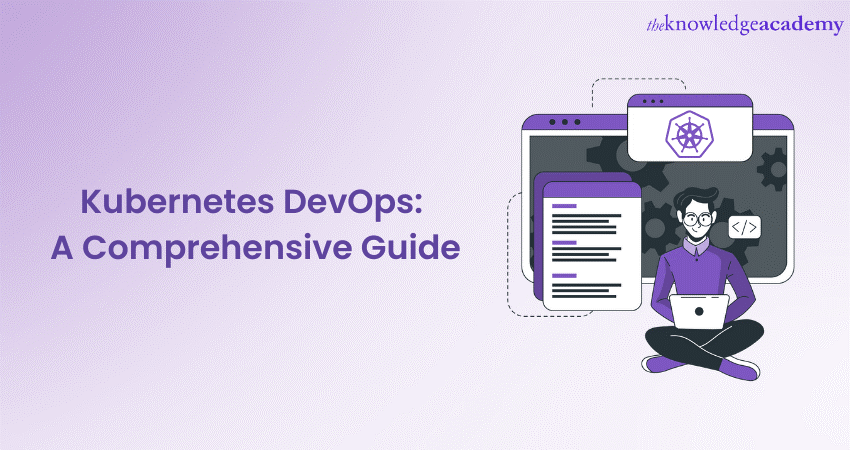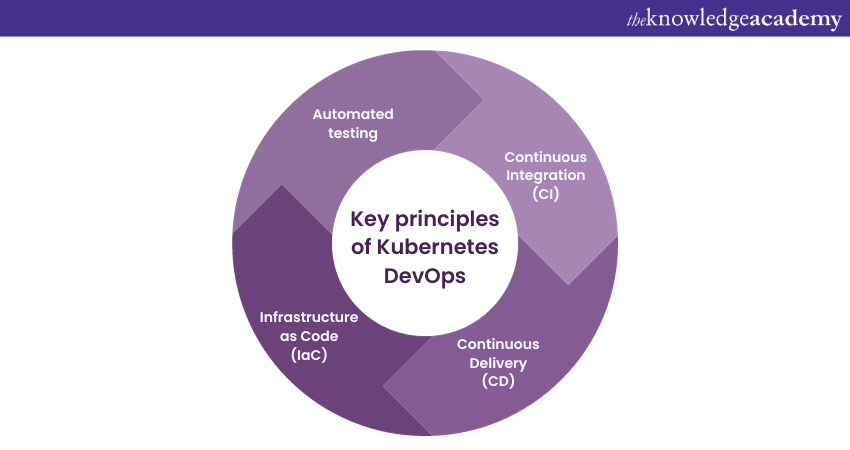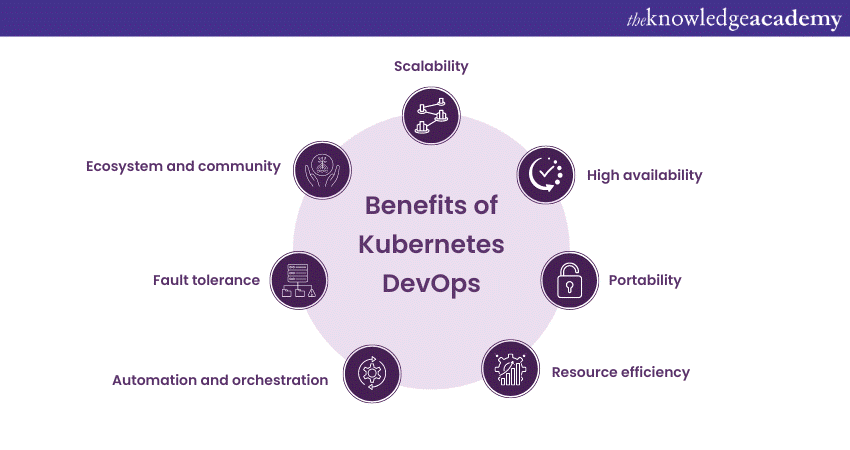We may not have the course you’re looking for. If you enquire or give us a call on 01344203999 and speak to our training experts, we may still be able to help with your training requirements.
Training Outcomes Within Your Budget!
We ensure quality, budget-alignment, and timely delivery by our expert instructors.

The modern software development industry requires effective and efficient software development and delivery practices. This need has urged organisations to adopt DevOps, a combination of development and operations, to bridge the gap between the two areas and promote collaboration. One of the many platforms that the methodology hosts is Kubernetes DevOps, which automates application scaling and streamlines infrastructure management. Kubernetes is a rapid process to complete the final prototypes successfully. Kubernetes DevOps is able to increase the agility of the process quite effectively
Out of the 1,296 IT leaders that Red Hat surveyed for the State of Enterprise Open Source 2022 report, 70% of them revealed that their organisations use Kubernetes. This statistic shows the growing popularity of Kubernetes, which has prompted aspiring professionals to enquire about what it is. This blog will tell you all you need to know about Kubernetes DevOps, its key principles, its benefits and its tools.
Table of Contents
1) What is Kubernetes in DevOps?
2) Key principles of Kubernetes DevOps
3) Six best practices for Kubernetes CI/CD
4) Kubernetes: An enabler for enterprise DevOps
5) Kubernetes DevOps tools
6) Benefits of Kubernetes
7) Conclusion
What is Kubernetes in DevOps?
Kubernetes can be defined as an open-source container orchestration platform that revolutionises software deployment in DevOps. It automates application scaling and distribution by allowing developers to define the desired state through configuration files.
Kubernetes simplifies infrastructure management by abstracting container complexities and offering features like load balancing, self-healing, etc. This frees up DevOps teams to focus on application logic, increasing productivity and speed to market. Kubernetes for DevOps follows the principle of infrastructure as code, enabling version-controlled configuration for reproducibility and collaboration between teams. It seamlessly integrates with other DevOps tools and practices, especially in Continuous Integration/Continuous Delivery (CI/CD) pipelines.
The release process becomes streamlined by automating building, testing, and deployment on Kubernetes clusters, minimising errors and promoting faster feedback loops. Kubernetes transforms how containerised applications are managed and deployed, empowering organisations to achieve greater efficiency and scalability in their DevOps workflows.
Key principles of Kubernetes DevOps

Key principles of Kubernetes DevOps encompass CI, CD, Infrastructure as Code (IaC), and Automated Testing. The principles are elaborated on as follows:
a) Continuous Integration (CI): Continuous Integration is a fundamental practice in Kubernetes that frequently integrates code changes from multiple developers into a shared repository. The CI developers merge their code changes regularly, ensuring early identification and resolution of conflicts. This promotes collaboration, reduces integration issues, and enhances code quality. In Kubernetes, CI involves automating application building, testing, and verification, guaranteeing that code changes can be seamlessly integrated into the Kubernetes cluster.
b) Continuous Delivery (CD): Continuous Delivery extends the concept of CI by automating the process of delivering application updates to production environments. It focuses on making deployments consistent, reliable, and easily repeatable. In Kubernetes, CD ensures that applications are packaged, tested, and deployed to Kubernetes clusters efficiently. By adopting CD practices, organisations can achieve faster time-to-market, reduce risks associated with manual deployments, and ensure that software releases are consistent and reliable.
c) Infrastructure as Code (IaC): Infrastructure as Code is a principle that involves managing and provisioning infrastructure resources using version-controlled, human-readable configuration files. In Kubernetes DevOps, IaC enables creating and managing Kubernetes clusters, including nodes, networking, storage, and other resources, through declarative configuration files. This approach promotes consistency, reproducibility, and scalability in managing Kubernetes infrastructure, making tracking changes, collaborating across teams, and automating infrastructure deployment easier.
d) Automated testing: Automated testing is crucial in Kubernetes to ensure the quality and stability of applications deployed on Kubernetes clusters. It involves automating the execution of various tests, including unit, integration, and end-to-end tests. By automating testing processes, Kubernetes teams can detect and address issues early, maintain application performance and reliability, and accelerate the feedback loop between development and operations. Automated testing helps validate that the deployed applications function correctly in the Kubernetes environment and adhere to the expected behaviour.
e) Transforming infrastructure: Using containers in Kubernetes ensures a consistent deployment and behaviour of applications and infrastructure, owing to their immutable nature. Kubernetes offers an abstraction of infrastructure that fully automates deployment and provisioning, eradicating the necessity for configuring individual software components. Kubernetes establishes a distinct separation between the operational runtime infrastructure and the deployment of applications.
IT personnel can concentrate on managing Kubernetes clusters and dealing with issues such as capacity management, infrastructure monitoring, disaster recovery, networking, and security. Simultaneously, application teams can dedicate their attention to constructing container images, deploying and configuring Kubernetes manifest YAML, and overseeing secrets.
Keen on gaining in depth knowledge about Kubernetes, refer to our blog on "Kubernetes Architecture"
Six best practices for Kubernetes CI/CD
The following are the six best practices of Kubernetes CI/CD:
Enforce Git-based workflows (GitOps)
1) Implement CI/CD pipelines through Git-based operations for consistency and increased development productivity.
2) Maintain all pipeline and environment changes in a single source repository for thorough review and easy rollback in case of production issues.
Utilise blue/green or canary deployment patterns
1) Employ blue/green deployment to run parallel application instances alongside production, facilitating easy rollback.
2) Implement canary deployment to serve an upgraded application version to a small percentage of users, gradually expanding the rollout based on user reception.
Deploy the same container that underwent testing:
1) Ensure consistency between containers deployed in staging, development, or QA environments and those deployed in production.
2) Use Git tags to trigger production deployments and containers with the corresponding commit ID.
Safeguard secrets
1) Store and encrypt digital credentials (secrets) outside the container to mitigate security risks.
2) Avoid exposing secrets in plaintext within code repositories, especially on platforms like GitHub.
Conduct container image vulnerability scans
1) Scan and test all new container images to identify vulnerabilities introduced by new builds or components.
2) Verify that container images have the expected content and accurate image specifications.
Employ Infrastructure as Code (IaC) scanning
1) Use IaC scanning tools to analyse standard cloud-native formats like Dockerfiles and Kubernetes YAML.
2) Apply rules to enforce security practices, identifying issues such as Docker images running as root and plaintext secrets within IaC templates.
3) Incorporate IaC scanning during initial configuration authoring and as part of ongoing automated testing throughout the CI/CD pipeline.
Kubernetes: An enabler for enterprise DevOps
Kubernetes possesses various features and capabilities that render it highly beneficial for constructing, deploying, and expanding enterprise-level DevOps pipelines. These capabilities empower teams to automate tasks that would otherwise necessitate manual orchestration. Adopting such automation is essential for teams aiming to enhance productivity and, more crucially, elevate the overall quality of their processes.
Infrastructure and configuration as code
1) Kubernetes allows developers to build entire infrastructures using the code paradigm.
2) It streamlines the management of complex infrastructure configurations, including application components, access controls, ports, and databases.
Version Control for code:
1) Integrating Version Control systems with Kubernetes manages both application code and infrastructure configurations.
2) Simplifies collaboration, enabling seamless definition and modification of code and configurations.
Cross-functional collaboration:
1) Kubernetes provides granular control in DevOps pipelines, facilitating nuanced role management and application-specific actions.
2) Ensures consistency in configurations and resources, allowing role-based action restrictions.
On-demand infrastructure:
1) Kubernetes offers a self-service catalogue, enabling dynamic on-demand creation of infrastructure.
2) Developers can provision cloud services while maintaining consistency and security through defined configurations.
Zero-downtime deployments:
1) Kubernetes' rolling updates and automated rollback features minimise or eliminate downtime during deployments.
2) Allows advanced deployment strategies like blue/green deployments and facilitates A/B testing.
3) DevOps methodology enhances the entire Software Development Life Cycle (SDLC) through collaboration, communication, integration, and automation.
Containers and microservices:
1) Containers and microservices accelerate the development life cycle by enabling granular modifications on a smaller scale.
2) Managing many containers in enterprise-grade systems requires careful configuration.
Challenges in complex pipelines:
1) Kubernetes' robust automation may face challenges in complex pipelines with diverse languages and integrations.
2) Complexity is compounded by data privacy and security compliance considerations, demanding heightened visibility and management controls.
While not a perfect fit for every scenario, Kubernetes is powerful and versatile when configured judiciously. Teams should exercise caution, avoiding overextension and recognising that Kubernetes doesn't provide a one-size-fits-all solution.
Want to take the next step in your DevOps journey and become a certified DevOps professional? Sign up for our Certified DevOps Professional Course now!
Kubernetes DevOps tools
Kubernetes DevOps tools are crucial in streamlining and enhancing the efficiency of software development and deployment processes on Kubernetes clusters. These tools provide comprehensive solutions for managing various aspects of the Kubernetes ecosystem. Let's explore some of the key tools:
a) Helm: It is a prevalent package manager for Kubernetes that streamlines the deployment and management of applications. It allows users to define and package Kubernetes resources as charts, making sharing, installing, and upgrading applications easy. With Helm, DevOps teams can automate the installation of complex applications and manage their lifecycle efficiently.
b) Kustomize: Kustomize is a native configuration management tool for Kubernetes that enables the customisation of Kubernetes resources without modifying the original YAML files. It provides a declarative approach to managing configurations, allowing DevOps teams to customise and deploy applications across different environments easily. It simplifies the process of managing and maintaining Kubernetes configurations for various deployments.
c) Jenkins: Jenkins is a popular open-source automation server that integrates seamlessly with Kubernetes. It provides a robust platform for implementing CI/CD pipelines. DevOps teams can utilise Jenkins to automate building, testing, and deploying applications on Kubernetes clusters. Jenkins offers a rich ecosystem of plugins and integrations, making it highly versatile for implementing various deployment workflows.
d) GitLab CI/CD: GitLab CI/CD is a complete DevOps platform with a built-in continuous integration and deployment system. It integrates tightly with Kubernetes, enabling DevOps teams to define and automate the entire software delivery pipeline within a single platform. GitLab CI/CD provides a straightforward configuration process and simplifies the management of CI/CD workflows for Kubernetes applications.
Enhance your DevOps expertise with our Certified DevOps Security Professional (CDSOP) Course – register today!
Benefits of Kubernetes

DevOps Kubernetes offers numerous benefits that revolutionise how organisations deploy, manage, and scale applications. This section of the blog will elaborate on some of the key advantages of Kubernetes as follows:
a) Scalability: Kubernetes provides robust capabilities for the horizontal scaling of applications. Kubernetes allows organisations to scale their applications effortlessly by dynamically adding or removing containers based on workload demands. It automatically handles load balancing and distribution of traffic, ensuring optimal performance even during peak usage periods.
b) High availability: Kubernetes promotes high availability by enabling the deployment of applications across multiple nodes in a cluster. It automatically monitors the health of containers and nodes, restarting or rescheduling them in case of failures. This resilience ensures that applications remain accessible and operational, minimising downtime and enhancing user experience.
c) Portability: Kubernetes facilitates application portability by removing the underlying infrastructure details. Applications deployed on Kubernetes can be easily migrated across different environments, such as on-premises, public cloud, or hybrid setups. This portability empowers organisations to avoid vendor lock-in and leverage the flexibility of deploying applications wherever it makes the most sense for their business.
d) Resource efficiency: Kubernetes optimises resource utilisation by intelligently managing container placement and resource allocation. It ensures that applications run efficiently on the available resources, minimising wastage and maximising utilisation. This resource efficiency translates into cost savings and improved performance.
e) Automation and orchestration: Kubernetes automates various application deployment and management aspects, reducing the manual effort required. It provides powerful orchestration capabilities, allowing for complex application deployments with ease. Kubernetes automates scaling, load balancing, networking, and service discovery tasks, enabling DevOps teams to focus on higher-value activities.
f) Fault tolerance: Kubernetes incorporates fault tolerance mechanisms to ensure application reliability. It supports self-healing capabilities by automatically restarting failed containers or rescheduling them to healthy nodes. This fault tolerance minimises the impact of failures and contributes to the system's overall resilience.
g) Ecosystem and community: Kubernetes benefits from a vibrant ecosystem and a strong community of contributors. This translates into extensive support, a rich set of tools, and a wide range of integrations with popular DevOps technologies. Organisations can leverage this ecosystem to enhance their Kubernetes deployments, access additional functionalities, and collaborate with the community for best practices and troubleshooting.
Conclusion
Kubernetes DevOps combines the power of Kubernetes with DevOps practices to streamline software development and deployment processes. By leveraging continuous integration, continuous delivery, infrastructure as code, and automated testing, organisations can achieve efficient and scalable application deployments on Kubernetes. Integrating the principles and practices of Kubernetes with DevOps empowers businesses to build and deploy robust applications with speed and reliability.
Unleash the power of Kubernetes DevOps with our Kubernetes Training for DevOps Course - boost your skills today!
Frequently Asked Questions

Yes. Kubernetes remains highly sought after in the IT industry. Its role in streamlining containerised application deployment and management, coupled with the growing popularity of microservices, ensures a continued demand for Kubernetes expertise. Professionals with Kubernetes skills are valued for optimising infrastructure and improving software development efficiency. Staying updated on Kubernetes trends and certifications enhances marketability in the evolving cloud and container technology domain.

Kubernetes is integral to DevOps, automating containerised application deployment, scaling, and management. It streamlines collaboration, supports Infrastructure as Code (IaC), and enhances deployment processes with features like rolling updates. Kubernetes aligns with DevOps principles, accelerates the Software Development Life Cycle (SDLC), and enables on-demand infrastructure provisioning. Careful configuration is crucial despite its power, and challenges may arise in complex pipelines. It's a versatile tool but not a one-size-fits-all solution.

The Knowledge Academy takes global learning to new heights, offering over 30,000 online courses across 490+ locations in 220 countries. This expansive reach ensures accessibility and convenience for learners worldwide.
Alongside our diverse Online Course Catalogue, encompassing 17 major categories, we go the extra mile by providing a plethora of free educational Online Resources like News updates, blogs, videos, webinars, and interview questions. Tailoring learning experiences further, professionals can maximise value with customisable Course Bundles of TKA.

The Knowledge Academy offers various DevOps Courses, including Kuberflow Training, Docker Course, and Octopus Training. These courses cater to different skill levels, providing comprehensive insights into Kubernetes methodologies.
Our Programming & DevOps Resources covers a range of topics related to DevOps, offering valuable resources, best practices, and industry insights. Whether you are a beginner or looking to advance your Project Management skills, The Knowledge Academy's diverse courses and informative blogs have you covered.
Upcoming Programming & DevOps Resources Batches & Dates
Date
 Kubernetes Training
Kubernetes Training
Fri 14th Feb 2025
Fri 11th Apr 2025
Fri 13th Jun 2025
Fri 15th Aug 2025
Fri 10th Oct 2025
Fri 12th Dec 2025







 Top Rated Course
Top Rated Course



 If you wish to make any changes to your course, please
If you wish to make any changes to your course, please


